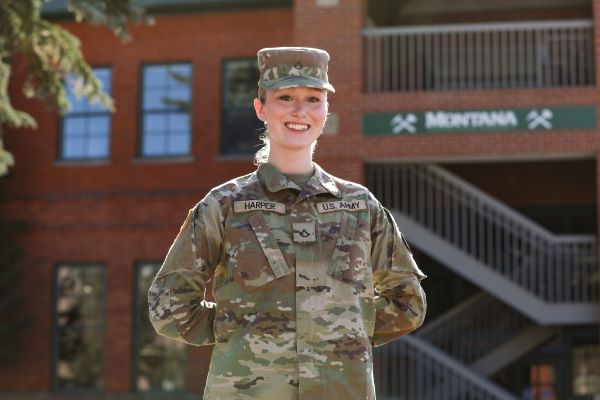Pre-pharmacy freshman says Army National Guard provides life-changing training

Emma Harper, a pre-pharmacy freshman at Montana Technological University, works as a technician in the emergency room at St. James Hospital-Intermountain Health in Butte. While the ER can be a stressful place to work for some people, Harper says she rarely gets flustered because of the training provided to her by the Army National Guard.
“Army mental stimulation is under duress,” Harper said. “You are super stressed out and you are thinking, ‘what is the next best thing I can do to make this situation better?’ In the ER, it is much more routine stuff.”
Harper graduated from Butte High in June 2023. She shipped out to Fort Sill in Oklahoma for Army Basic Combat Training, also known as bootcamp, in July 2023. The 10-week program is the same training that all soldiers and guardsmen undergo. It’s a tough 10-week program that is meant to push new recruits to their limits while teaching them the customs and expectations of the U.S. Army.
“It teaches you that you can do a lot more than you think you can,” Harper said. “A lot of people, including myself, are afraid of heights. I had to rappel down a 40-foot wall. There’s a lot of physical training. I made it through by telling myself that if I can get through the next five minutes, I can get through it. If I can get to breakfast, then I can get to lunch, then I can get to bedtime.”
Challenges at bootcamp are difficult. In one exercise, participants were exposed to a small amount of tear gas.
“I really thought I was going to die,” Harper said.
In addition to combat training and physical challenges, guardsmen are mentally challenged by only getting one phone call with their family on Sundays. Harper says completing the 10 weeks was a huge milestone.
“It really was terrifying for me,” Harper said. “It was scary, but when I finished it felt better than when I graduated high school. After 10 weeks of basic training, I felt more accomplished than when I completed 12 years of education.”
The training was a huge catalyst for personal growth.
“I realized I was always strong, it just showed me how strong I am,” Harper said.
From Fort Sill, Harper was sent to Fort Sam Houston in San Antonio, Texas. While the guardsmen were given more liberties in this 16-week camp and family could come to visit, the training for Harper’s assigned position within the military intensified. Harper is a medic/healthcare specialist. She completed an EMT training course in six weeks and passed the national exam to earn her EMT license.
In the field portion of the training, Harper learned how to place IVs and conduct blood draws, all under simulated combat.
“We learned how to deliver care when you are getting shot at, deliver care when you aren’t getting shot at, and how to evacuate someone,” Harper said.
Harper was taught the different ways to tourniquet someone if an improvised explosive device detonated.
“I got a lot of training that has been so helpful,” Harper said. “It’s furthered my career so much. It also helps my understanding of healthcare.”
Learning to deliver care in the field involved being camped out in the field, asleep, and being woken up to fake grenades and smoke bombs.
“Our boots were soaked,” Harper remembers. “Our socks were soaked. We had our dummy weapons and were sprinting across the field, trying to get the whole platoon in order.”
When Harper returned to Butte in February 2024 she was assigned to the Montana Medical Readiness Detachment, which delivers care to veterans and active duty service members. She is committed to serving one weekend per month at Fort Harrison and two weekends per summer.
“They all have to come to us to get their yearly health assessments,” Harper said.
Harper started classes at Montana Tech in Fall 2024. While it was difficult to delay entry to college that long, she says it’s worth it to have grown personally, and to have her college paid for through the Montana National Guard Tuition Waiver.
“All I pay for right now is my fees or books, and honestly people have been great about gifting me books. There are also some free online textbooks.”
Harper plans to go to Montana Tech for two years and then transfer into the University of Montana Skaggs School of Pharmacy. She’s saving her earnings from working now so she won’t have to work as much during pharmacy school.
She says students considering going into the military should explore options like the Army National Guard, Air National Guard, and Army ROTC.
“Talk to somebody who has been in,” Harper said. “Four or six years seems like forever, but I’ve been in for almost two years and it’s gone by in a blink. Definitely consider all of your options. Basic training is a little bit longer. If you are worried about missing school and that’s your only holdback, just do it. School is always going to be there.”
Harper says the experience comes with valuable lessons that are not learned at college.
“I’ve made so many friends,” Harper said. “I’ve learned so much, not just about myself, but the field I’m going into. You also learn how to be an adult in a way you don’t learn in college. You have a head start on life in a lot of ways.”
To learn more about the Montana National Guard, visit https://montanaguard.net/.